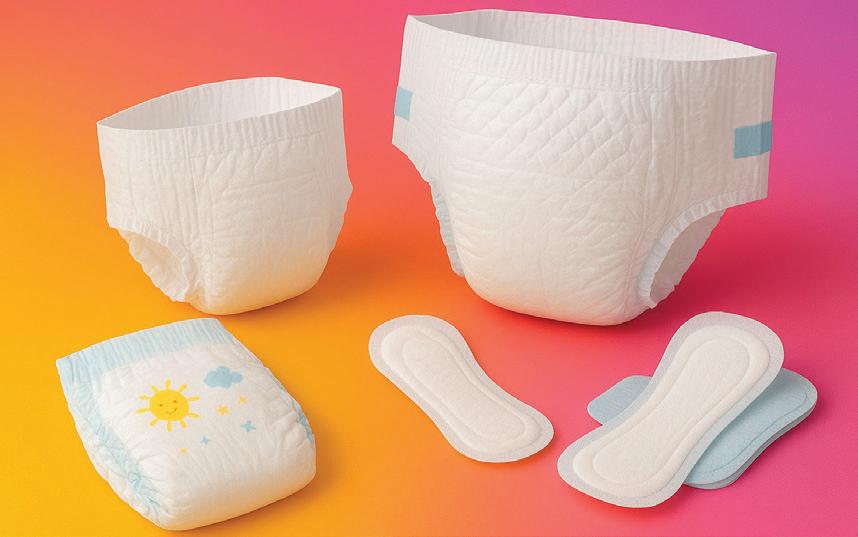
5 minute read
Absorbent Hygiene
INDA’s Hygienix 2025 will be held from November 17-20 at the Omni Orlando ChampionsGate Resort in ChampionsGate, Florida.
”Hygienix exemplifies INDA’s commitment to empowering companies in the absorbent hygiene and personal care markets to advance their businesses,” says INDA president Tony Fragnito. ”The insights and connections made at this event drive growth and enable participants to meet evolving demands and market challenges.”
Texas, respectively. Both have achieved significant reductions in CO2 emissions, driven by ambitious targets for 2030 and the innovations of their suppliers.
P&G Packaging Focus
To date, P&G has primarily focused on the packaging of its AHPs to drive resource efficiencies. Through its Ambition 2030 framework, P&G aims to make 100% of its packaging recyclable or reusable by 2030, and reduce virgin petroleum-based plastic use by 50% per unit compared to 2017. Nearly 99% of the brand’s paper packaging now comes from recycled or certified virgin sources, and 75% of virgin paper packaging is FSC-certified – surpassing an initial 50% target for this year.

Recognizing breakthrough products, technologies, and solutions that are making a significant impact in the hygiene sector, the Hygienix Innovation Award will also be awarded at the event.

Last year’s winner was Austin, Texasbased Hiro Technologies, the developer of MycoDigestable diapers, which were subsequently commercialized in 2025. These diapers feature an integrated pouch containing plastic-eating fungi capable of quickly biodegrading the entire product after use.
Leaders in AHPs
Driving developments along the nonwovens supply chain is the sustainable targets of major manufacturers for absorbent hygiene products (AHPs), like baby and adult diapers, and feminine care products. At the forefront of the AHPs market in North America are Procter & Gamble (P&G) and Kimberly-Clark (K-C), headquartered in Cincinnati, Ohio, and Irving,
In forestry sourcing, P&G maintains 100% third-party certified wood pulp, with 90% of packaging in its Family Care segment for AHPs being FSC-certified. It has further pledged to invest $20 million between this year and 2030 in alternative pulp development and to enhance transparency in pulp sourcing.
Net Zero by 2030
P&G’s target is to achieve a 65% reduction in its operational Scope 1 and 2 greenhouse gas emissions by 2030 compared to 2010 levels, and then achieve net zero across its supply chain and operations by 2040. Over 99% of the brand’s electricity usage is already from renewable sources and its Scope 3 supply chain emissions intensity has meanwhile been reduced by 60% compared to a 2020 baseline.
In partnership with Dow Chemical, a Midland, Michigan-based Company, P&G is further developing a recycling process that transforms hard-to-recycle plastics into near-virgin quality polyethylene (PE) using dissolution technology.
An existing polypropylene (PP) resin purification process, called VersoVita, is already commercially available at scale, licensed to PureCycle Technologies, headquartered in Orlando, Florida, and is still used internally by P&G while being offered for broader adoption.
Plastics Footprint
Kimberly-Clark has committed to reducing its plastics footprint by 50% by 2030, compared to 2019, through a combination of material efficiency, renewable/recycled substitutes, reusable product formats, and circular systems.
It has also pledged to become 100% Natural-Forest-Free across its product portfolio – meaning no raw materials from untouched or regrown natural forests – by 2030.
The company has already reduced its Scope 1 and 2 GHG emissions by nearly 41% and launched renewable energy initiatives, surpassing its water footprint targets.
K-C has also begun introducing reusable feminine care and incontinence products in select markets, alongside sustainable packaging innovations such as the Kotex paper pouch.
In February 2022, K-C took a majority stake in New York-based Thinx, giving it a ready-made platform in reusable period underwear, teen lines and bladder-leak underwear. Despite some restructuring in 2024, Thinx remains the category’s most recognizable brand and has extended K-C into true reusable products.
Reusables
Away from the activities of these major brands, the reusable diapers and femcare markets are now thriving, reflecting a global shift towards sustainability, health consciousness, and product innovation. Cloth diapers – especially hybrids and absorptive fabrics – are increasingly practical and stylish and led by smaller upcoming brands such as Alva Baby (Shenzen, China), Bambino Mio (Northampton, UK), BumGenius (Chesterfield, Missouri), Charlie Banana (Hong Kong), GroVia (Seattle, Washington), and Thirstie (New York). Convenient purchasing models and eco-driven trends support this growth.
In the femcare sphere, reusable solutions such as menstrual underwear, cups, and cloth pads are gaining traction. In addition to Thinx, companies such as Aisle (Vancouver, Canada), Eco Femme (Tamil Nadu, India), GladRags (Portland, Oregon), Mooncup (Brighton, UK), and OrganiCup (Copenhagen, Denmark) are elevating the market with new ethical, transparent, and socially responsible products. Both segments converge on themes of sustainability, performance, and accessibility. www.hygienix.org
Policy Concerns
EDANA’s Sustainability & Policy Forum 2025 will meanwhile take place from December 9-10, 2025, at the Residence Palace in Brussels, with an emphasis on how policy and new regulations are shaping supply chain innovation. Smart policy making is essential, especially in the EU, towards future viable sustainable solutions for the nonwovens industry.
Shedding light on this is the event’s keynote speaker is Jessika Roswall, Commissioner, Environment, Water Resilience and a Competitive Circular Economy – European Commission.
Dedicated sessions will address the expectations of stakeholders in respect of circular economy topics, green claims, sustainability reporting, and corporate due diligence.
Session themes include:
• Opportunities stemming from sustainability reporting.
• Chemical recycling technologies as a key to sustainability success.
• Protecting the industry through advocacy.

The advocacy piece includes an EU Advocacy Workshop that will provide in-depth insight into EDANA’s ongoing advocacy efforts at the EU level, with an overview of our current policy efforts. This offers participants a clear picture of the main regulatory issues impacting our industry.

This session is followed by a unique visit to the European Commission, where discussions will continue to address sustainability policies.
”The EU’s shift towards balancing sustainability with competitiveness will shape not only policy but the very framework within which we operate,” says EDANA public affairs director Brieuc Lits. ”The sector must adapt to stay competitive and aligned with regulatory expectations.”
”Sustainability is at the core of organizations like EDANA, but we have seen something of a change in direction, or an adaptation of goals from within the ‘Brussels Bubble’ recently,” adds EDANA’s general manager, Murat Dogru. ”There is now a positive recognition that the safeguarding of industries is necessary, and legislation needs to be realistic and ensure we don’t lose the competitive advantages we have. Sustainability goals are still there, but there is also an understanding that there are maybe different routes we can take to give ourselves the resources to achieve them in the right way. That said, the EU’s goals have been embraced by our industry from the beginning and there is no question of pushing any stop button.”
Green Claims
Policy issues of current concern for EDANA, however, include the European Commission’s Green Claims Directive, which in its current form is viewed by many trade associations as insufficiently workable, predictable, and harmonized. EDANA fears that it will discourage companies from communicating their legitimate sustainability efforts – a concept now referred to as ‘greenhushing’, as opposed to ‘greenwashing’ – and divert critical resources from sustainability innovation to compliance, ultimately undermining the EU’s competitiveness. www.edana.org/events/ edana-sustainability-forum

Adrian Wilson is an international correspondent for International Fiber Journal . He is a leading journalist covering fiber, filtration, nonwovens and technical textiles. He can be reached at adawilson@gmail.com.










